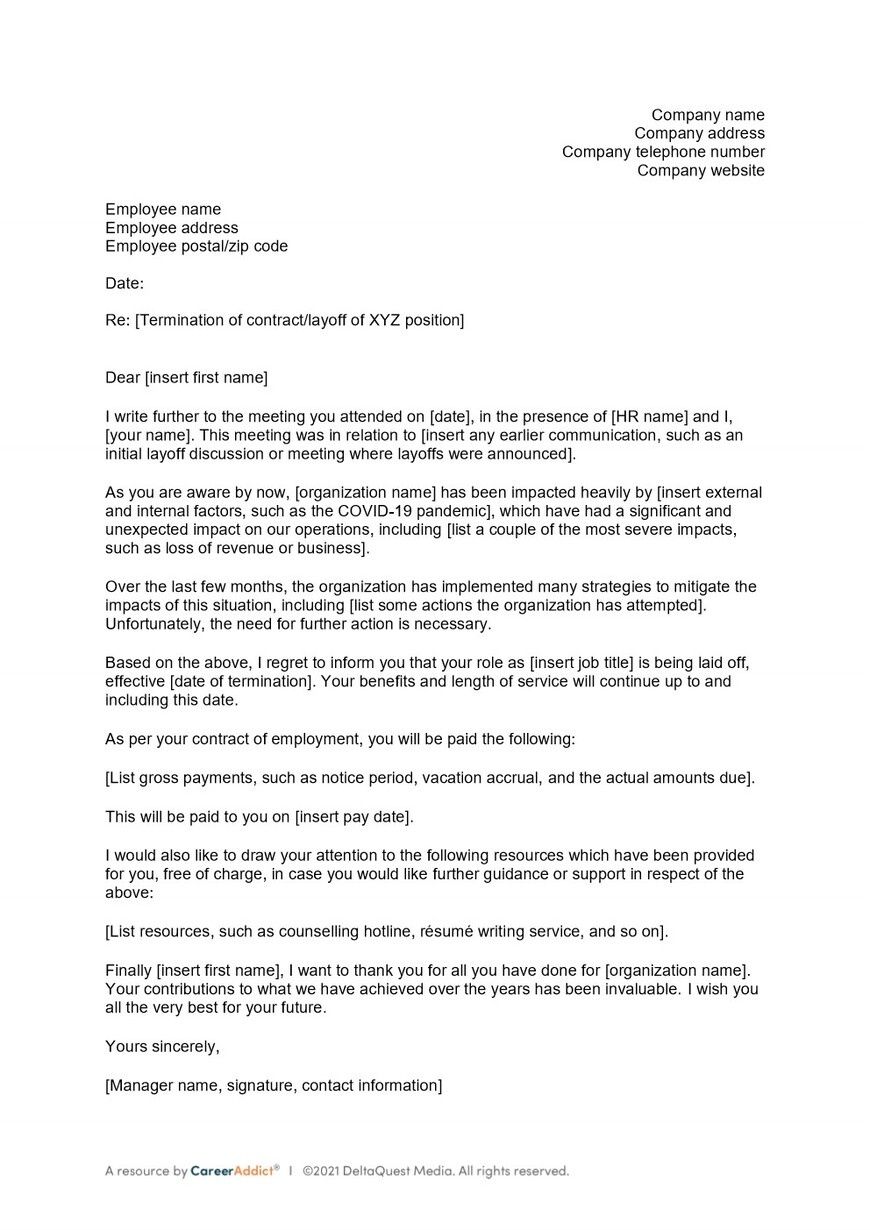Returning To Your Old Job After A Layoff: Pros, Cons, And Considerations

Table of Contents
The Allure of the Familiar: Pros of Returning to Your Old Job
Returning to a familiar workplace can feel incredibly appealing after the stress of a layoff. Let's explore the advantages:
Known Territory and Reduced Stress
- Familiarity with company culture: You already understand the work environment, the unspoken rules, and the overall atmosphere.
- Established relationships: You have pre-existing connections with colleagues and superiors, reducing the awkwardness of building new professional relationships.
- Reduced learning curve: You already know the processes, systems, and expectations, enabling a quicker and smoother transition back to work.
- Less job search anxiety: You bypass the stressful and often lengthy process of searching for a new position and navigating interviews.
Returning to a familiar environment significantly reduces the stress and uncertainty inherent in a new job search. The comfort and predictability can be invaluable during a challenging time.
Potential for Career Advancement
Returning to your old job after a layoff presents opportunities for career growth:
- Rebuild trust and demonstrate commitment: Your return showcases loyalty and dedication to the company.
- Showcase improved skills: The time off might have been used for upskilling or freelance work, providing you with new skills to offer.
- Faster promotion: Demonstrating your continued value could lead to quicker promotions or increased responsibilities.
A rehire can be a strategic move to propel your career forward within the organization. Use this opportunity to highlight your growth and demonstrate your commitment.
Financial Stability and Benefits
The financial benefits of re-employment are undeniable:
- Immediate income: You immediately alleviate financial pressures, eliminating the gap in your income stream.
- Continuation of benefits: Health insurance, retirement plans, and other benefits continue without interruption.
- Potential for severance pay or re-employment bonuses: Some companies offer additional compensation to encourage rehiring.
Financial stability is a significant advantage, especially after the uncertainty of a layoff. The security it offers allows you to focus on your career rather than immediate financial concerns.
Navigating the Challenges: Cons of Returning to Your Old Job
While the allure of familiarity is strong, it's crucial to acknowledge the potential downsides:
Potential for Lingering Resentment or Tension
- Strained relationships: Layoffs can leave lingering resentment among colleagues and management.
- Perceived weakness: Returning to your old job might be interpreted as a lack of marketability or a sign of weakness.
- Feeling undervalued: You may feel overlooked or undervalued if your previous role or compensation isn't adjusted fairly.
Carefully consider the emotional toll and the potential for uncomfortable workplace dynamics before accepting a rehire offer.
Salary and Benefits Re-evaluation
- Negotiating a fair salary: You need to advocate for a salary that reflects your current market value, especially if you’ve gained new skills.
- Potential for lower salary: Your initial salary may not be reinstated, especially if the company is facing financial difficulties.
- Limited negotiation power: Your negotiating power might be reduced, especially if you’re desperate for income security.
Negotiating your compensation is vital. Research industry standards before engaging in salary discussions.
Limited Growth Opportunities
- Stagnation: If the layoff was due to systemic issues within the company, returning may limit your growth potential.
- Lack of diversification: Staying in the same role prevents you from exploring new areas or diversifying your skills.
Consider your long-term career aspirations. Returning to your old job might not be the best move if your career goals extend beyond the limitations of your previous role.
Critical Considerations Before Accepting a Rehire Offer
Before making your decision, carefully consider these points:
Understanding the Reasons for the Layoff
- Company restructuring: Was the layoff due to genuine restructuring or temporary financial difficulties?
- Performance issues: Were there performance issues leading to your layoff?
- Economic downturn: Was it part of a larger economic trend, indicating broader industry instability?
Understanding the root cause is paramount in determining the long-term stability of the position and the company.
Negotiating Your Compensation and Benefits
- Research industry salary standards: Use online resources and professional networks to determine your market value.
- Understand your worth: Quantify your skills and experience to justify a fair salary.
- Prepare a counteroffer: Don’t be afraid to negotiate and present a counteroffer if the initial offer is too low.
- Clarify benefits packages: Thoroughly review the details of any benefits packages before accepting the offer.
Approach negotiations strategically and confidently, ensuring you receive fair compensation for your skills and experience.
Setting Clear Expectations
- Define roles and responsibilities: Clearly outline your roles and responsibilities to prevent misunderstandings.
- Discuss career trajectory: Discuss your future prospects and career trajectory within the company.
- Address past issues: If previous issues contributed to the layoff, address them openly and honestly to ensure a smoother transition.
Open communication and clear expectations are crucial for a positive and productive experience.
Making the Right Choice After a Layoff
Returning to your old job after a layoff presents a unique set of advantages and disadvantages. We’ve explored both sides, emphasizing the importance of understanding the reasons behind the layoff, and evaluating both short-term financial stability and long-term career goals. Carefully consider all factors before deciding whether returning to your old job after a layoff is the right move for you. Weigh the pros and cons thoughtfully, focusing on what aligns best with your personal and professional aspirations.

Featured Posts
-
 The Los Angeles Wildfires And The Growing Market For Disaster Bets
Apr 26, 2025
The Los Angeles Wildfires And The Growing Market For Disaster Bets
Apr 26, 2025 -
 Beyond Disney 7 Top Orlando Restaurants For 2025
Apr 26, 2025
Beyond Disney 7 Top Orlando Restaurants For 2025
Apr 26, 2025 -
 Nfl Draft 2024 First Round Kicks Off In Green Bay
Apr 26, 2025
Nfl Draft 2024 First Round Kicks Off In Green Bay
Apr 26, 2025 -
 Evaluating The Future Of Chinas Car Exports
Apr 26, 2025
Evaluating The Future Of Chinas Car Exports
Apr 26, 2025 -
 Floridas Charm A Cnn Anchors Favorite Vacation Spot
Apr 26, 2025
Floridas Charm A Cnn Anchors Favorite Vacation Spot
Apr 26, 2025
